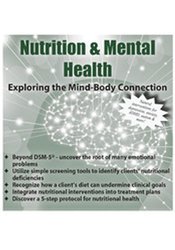

A New Paradigm in Treating Mental Disorders
We have all had clients who come into the office in a depressed or anxious state, and yet they cannot identify just what is bothering them. Children are brought in with symptoms of ADHD, suicidal ideation, or an eating disorder. Clients with addictions struggle to gain control of themselves. Many elderly clients have no energy or zest for life, and may appear to be suffering from dementia. Others are suffering with many physical complaints in addition to presenting with serious depression; and we have all seen those who have literally been anxious all their lives. Talking in these cases often does not produce the desired results, and both client and professional become frustrated.
In this dynamic seminar, Ms. Elizabeth Szlek, MA, LMHC, NCC, NTP, CGP, shares her decades of experience integrating nutrition into therapy, along with the cutting edge of nutritional research. Discover highly effective, non-pharmaceutical interventions for disorders such as anxiety, depression, ADHD, autism, schizophrenia, eating disorders, bipolar, and addictions. Walk away from this seminar with the knowledge and tools to approach these problems from a new perspective, and improve your therapeutic outcomes by incorporating this important mind-body connection.
This online program is worth 5.25 hours CPD.
| File type | File name | Number of pages | |
|---|---|---|---|
| Manual - Nutrition and Mental Health (1.41 MB) | 131 Pages | Available after Purchase |
Elizabeth J. Szlek, MA, LMHC, NCC, NTP, CGP, has 20 years of experience as a mental health professional and has her own private practice, The Door Counseling Center. She earned a Master of Arts degree in Counseling from Liberty University, a Master of Music degree from Yale University, and was awarded a Fulbright Fellowship to Poland.
Ms. Szlek is certified as a Nutritional Therapy Practitioner and a GAPS Practitioner. She has presented at many conferences at both the local and national levels, and authored numerous contributions to publications including The Utica Phoenix, In Good Health, Life and Times, The Rome Observer, Women in Motion, and the "Your Mental Health" column in The Adirondack Express. Ms. Szlek is also a member of the American Counseling Association and Nutritional Therapy Association.
Speaker Disclosures:
Financial: Elizabeth Szlek maintains a private practice. She receives a speaking honorarium from PESI, Inc.
Non-financial: Elizabeth Szlek is a member of the American Counseling Association; and the Nutritional Therapy Association.
The Root of the Problem
Traditional Foodways
20th Century Nutritional Problems
An Over-Medicated Society
Implications for Clinical Work
Satisfaction Guarantee
Your satisfaction is our goal and our guarantee. Concerns should be addressed to info@pesi.co.uk or call 01235847393.
Please wait ...